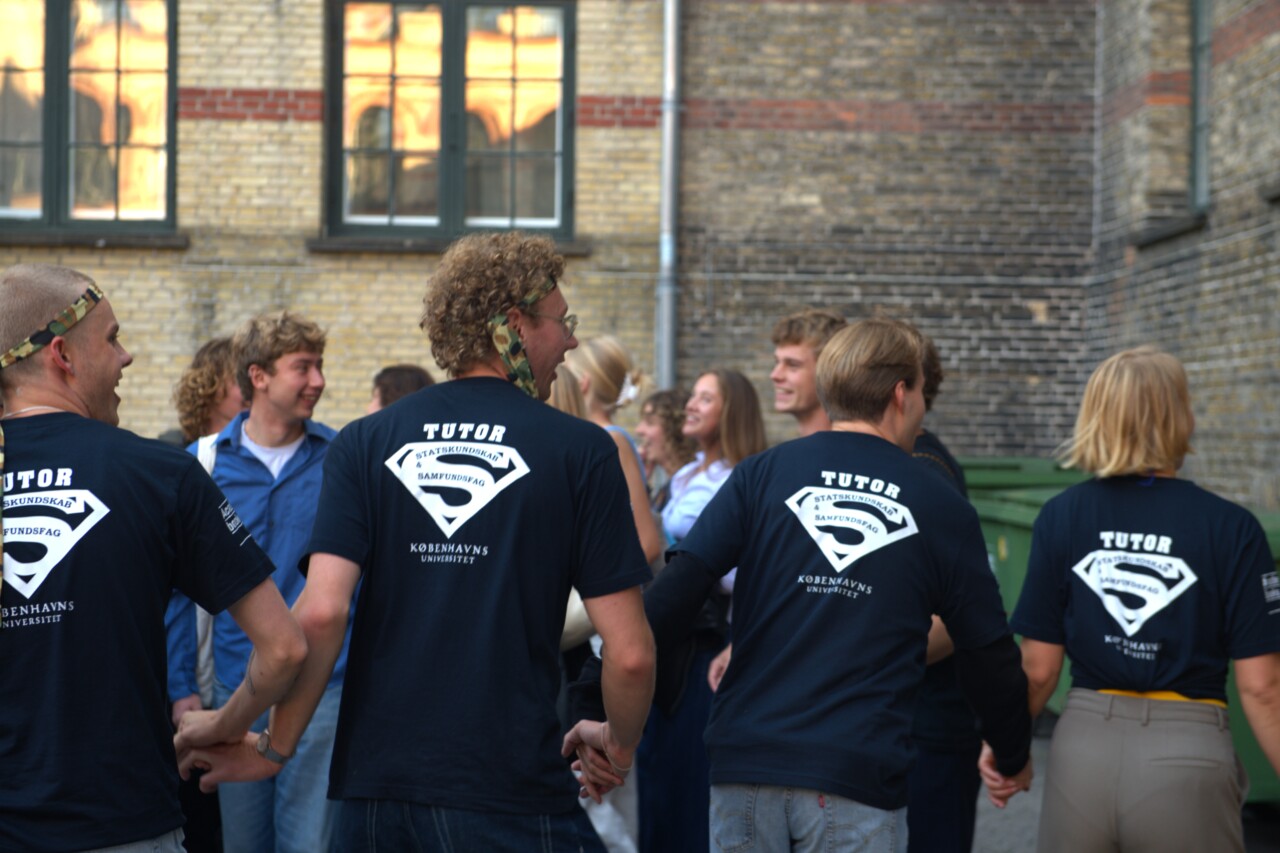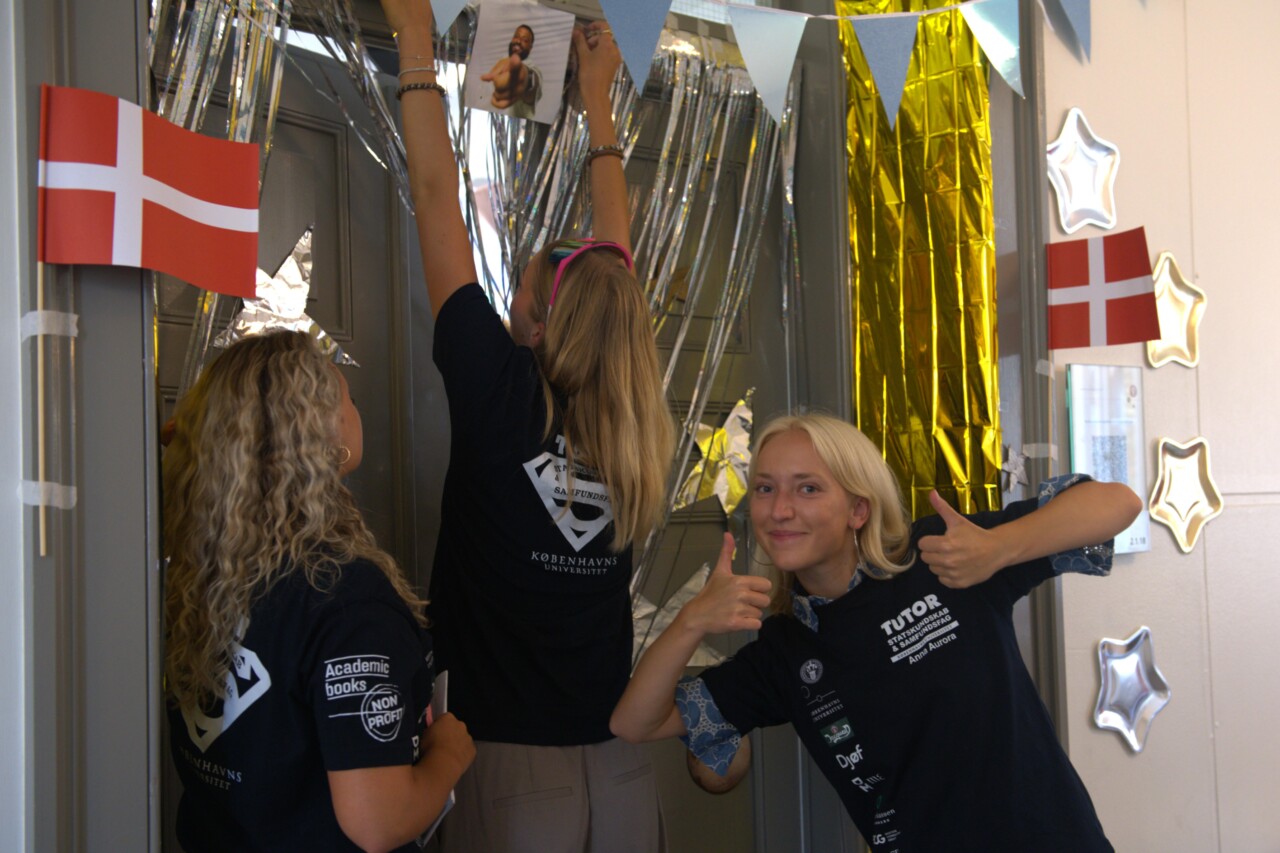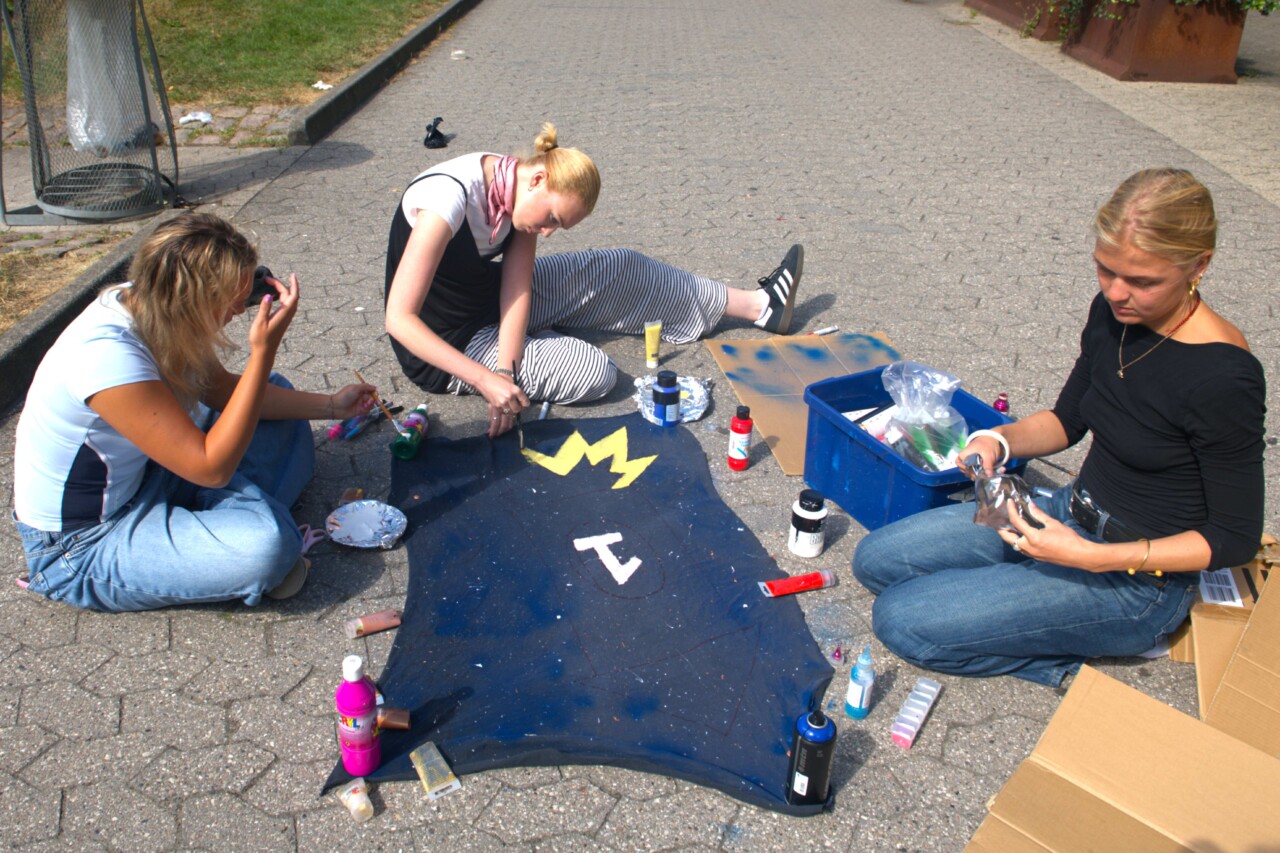Universitetsavisen
Nørregade 10
1165 København K
Tlf: 35 32 28 98 (mon-thurs)
E-mail: uni-avis@adm.ku.dk
—
Student life
Intro week — The controversial Political Science intro programme is now focussed on shaping an inclusive community. The University Post turned up to see what this looks like — ten years after the scandals erupted.
A severed pig’s head. Gender-segregated rituals. New male students asked to describe, in detail, which of the women they most wanted to have sex with.
Peer pressure, alcohol, discrimination. This is what the political science intro programme looked like back in 2014.
READ ALSO: Rituals for new students involved profanity, sexism, degradation (2014)
The backlash was immediate, management got involved, and over the following years, the intro programme had to be rethought several times.
By 2025, you’ll be hard pressed to find pig heads, alcohol or sexist antics at the Political Science department’s programme. But do the tutors — the term in Denmark for students who volunteer to guide new students through intro week — still long for the good old days? University Post has been given access to an otherwise secretive intro week to observe what the programme looks like today.
»Wouldn’t it be kind of fun if someone played a down-and-out can collector? Maybe with an over-the-top climate angle?«
It’s Sunday morning. The tutors at the Department of Political Science are busy preparing for the intro programme. On Tuesday morning, campus will be teeming with new students, but before that, there’s intense prep work: the tutors have to come up with games, decorate the rooms, and finalise practical details.
READ ALSO: Student of social sciences: »I honestly wish I had 48 hours in a day«
In the room that serves as group 1’s base, tutors are deep in discussion about what role their ‘fake fresher’ will play. It’s a tradition where a couple of tutors on each team dress up as new students (known as ‘russere’) and play an exaggerated, often comical character to get a few laughs from the newcomers. The aim is to ease the slightly tense atmosphere that often arises on the first day.
»The classic one is someone with a brutal hangover,« one of group 1’s tutors suggests.
»Yeah, we did that last year too. I’m worried the can collector might come off as a bit too caricatured,« another tutor replies.
The brainstorming continues, and the can collector idea is scrapped. They settle on a hungover student instead and a football fanatic. Everyone in the tutor group agrees these are safe choices that don’t cross anyone’s boundaries.
According to Christian Haun, who is also a tutor on group 1, the ‘fake fresher’ game is one of the traditions that is currently under the most scrutiny. In addition to being a tutor, he is part of the Kontaktudvalget (tutor coordination committee, ed.), the top decision-making body in the tutor programme. As a member of the committee, he helps make the final call on which names, games, and ideas make it through the approval process.
»We have a simple rule of thumb: If you’re in doubt, don’t do it,« he says.
In his own intro week, Christian Haun spent the first couple of hours chatting with someone he thought was a new fellow student. It later turned out to be a tutor playing a new student.
»I could handle it. But if it’s another, more vulnerable, student who thinks that they’ve just made a new best friend, it’s obviously not so great.«
It’s not just the ‘fake fresher’ game that requires extra thought. The group names are also discussed thoroughly.
Before the intro programme was reformed, all the groups at the Department of Political Science were named after countries — so you might be on Ghana, Canada or Thailand. The country name followed the group throughout the entire degree, but it was especially important during freshers’ week, where it served as the group’s theme. It all culminated in a big country competition where each group dressed up as their assigned country and played a version of the board game Risk against the others.
But the country game wasn’t without problems, and in 2021 it was scrapped after accusations of cultural appropriation and stereotypical portrayals of the countries. In a University Post article, it was described how Team Thailand dressed up as ladyboys and Team China sang about eating dogs.
After the country name scandal, department management stepped in and decided that groups would henceforth be named after the least controversial thing they could think of: The numbers one through seven. To keep things from getting too boring, however, the tutor coordination committee came up with the idea that each group would be assigned a theme each year, inspired by their respective number.
We have a simple rule of thumb: If you’re in doubt, don’t do it
It’s the group’s tutors who come up with the themes, and they serve as the focal point for many intro week activities. The group’s room is decorated to match the theme, for example, chants are composed, and tutors dress up according to the group’s theme. An Instagram profile is also created for each group, where new students and tutors can post memes and memories from the intro week in line with the theme’s spirit.
That’s why Christian Haun, and the rest of the tutor coordination committee, take the task of approving the group themes seriously. This year, the seven group theme names proposed by tutors were un1vers [universe, ed.], 2pform [in good shape, ed.], 3D [three-dimensional, ed.], 4svar [defence, ed.], MI5 [the British intelligence service, ed.], 6ofon [‘sexophone’, ed.] and Landmand 7er kærlighed [reality show ‘Farmer Wants a Wife’, ed.].
But are farmers a marginalised group? And is it not too militaristic to have a theme that revolves around defence?
»In the end, all the names were approved, even though there were a couple we had to consider a bit more carefully,« says Christian Haun.
The group that always causes the most trouble every year is group six, he says. Because of how the number sounds in Danish, it can easily lead to the wrong connotations:
»Most of the time, the tutors who get group six handle it well. At one point there was talk of ‘6y’ [sexy, ed.], and that one was probably right on the edge.«
At group un1vers, the tutors are busy decorating. Blue pennants hang from the ceiling, the room’s columns are being wrapped in gold and silver, and stars are being cut out in bulk.
»Remember to put out markers so the new students can write their own names on the signs. We don’t know what they prefer to be called,« one tutor reminds the others.
In one corner of the room, a couple of tutors are building a bar, which they christen the Space Bar. They lay out soft drinks on the counter and hide the beer crates, so no one is tempted to break the ‘no alcohol before 5 pm’ rule.
Outside, in one of the campus’s many gardens, three other tutors are busy painting the group’s flag. It’s early afternoon, and the conversation turns to the rules for intro week:
»I’m actually really glad that the 5 pm rule also applies to tutors. It means I haven’t even thought about drinking yet,« says one of the tutors as she paints a rocket ship on the flag.
The others nod. One of them says she’s considering signing up as ‘designated sober guide’ for the second day of intro week, when the evening’s activity is a trip to the nightclub Hive.
A tutor hug, a tutor hug, it’s a hug that makes you feel warm
Verse from welcoming song
As designated sober, you’re the one that others can turn to if something goes wrong during the night, or if any drunk students need help.
»I love dancing and have no problem doing it sober. And it’s kind of fun to watch all your friends get drunk,« says the one considering signing up.
Later, it turns out that there are several others who also find the idea of a sober night out appealing. When it’s time to pick the designated sober guides at the end of the day, hands shoot up into the air, and so many volunteers step forward that the tutor coordination committee has to choose among the eager candidates.
»Last year, we sat around waiting forever for someone to volunteer,« one surprised tutor says to another as the general meeting wraps up.
It’s 9 am on Tuesday. It’s the first day of intro week for the new students, and the tutors are hiding around campus, ready to surprise the new students as they arrive.
»They’re coming now, they’re coming now,« it echoes through the gates.
Tutors jump out from their hiding spots, grab each other’s hands and form a circle around a group of unsuspecting new students while singing: »A tutor hug, a tutor hug, it’s a hug that makes you feel warm.«
All the way from the main entrance to one of the old municipal hospital’s lecture halls, the new students are met by cheerful tutors waving flags and handing out hugs. Spirits are high among the tutors. The new students seem slightly bewildered.
Later in the day, groups compete in a sort of race. At one of the stations, there’s a theme from the TV show Paradise Hotel. Here, new students meet a Paradise contestant, a Paradise snake, and Dubai tycoon Alejandro. The group’s task is to draw a paradise for Alejandro.
Tutors should always stay two steps behind the boundary
A couple of new students who have led the drawing activity step forward to present:
»Alejandro likes the ladies, so of course he has a couple of strippers on his private jet,« says one of them, pointing to a drawing of a pole dancer.
»And here he is with a bottle of Moët,« the fresher continues.
»But only after 5 pm, right?« chimes in the costumed tutor playing Alejandro.
»Yes, of course, only after 5 pm,« the fresher laughs in agreement.
The crowd cheers and claps at the reference to the rule that alcohol is only allowed after 5 pm.
READ ALSO: Is woke (also) dead at the University of Copenhagen?
A pole dancer, on paper, is a far cry from a real stripper. Still, Camilla Angaard Nielsen, a first-time tutor who witnessed the scene, says it’s important that tutors stay aware of whether anyone present finds the situation uncomfortable.
»Tutors should always be two steps behind the boundary,« she says, while also pointing out the dilemma this presents:
»At the same time, we need to avoid being preachy.«
Camilla Angaard Nielsen says the tutor team had discussed whether they should tell the new students in advance not to post anything inappropriate on the group’s Instagram. But the tutors agreed it was better to respond afterwards if something crossed a boundary, rather than come across as condescending upfront.
According to Christian Haun, the most important thing in situations like these is to make sure the new students don’t feel ashamed:
»We never call people out if they go too far — unless it’s something really serious,« he says.
At Political Science, there are plenty of traditions — but in the intro programme, nothing is sacred anymore. Every year, the new students evaluate the programme, and the tutors take the feedback seriously. Christian Haun explains that it’s this approach that allows the programme to keep evolving.
»I think the intro programme has really landed in a good place. People are happy with it, and a healthy culture has been created. As far as I’m concerned, it could look completely different and still be great.«
Christian Haun admits he can see the appeal of some elements from the old intro format. He would have liked to try the Risk-inspired country competition, for example. But based on everything he’s heard, he understands why it was scrapped:
»The problem with the game was that it encouraged stereotypes — even if you chose fictional countries. And that’s not okay in an intro programme.«
Several tutors point out that traditions can be problematic. Anna Borrisholt, who is a tutor for the second year in a row, says:
»Traditions stop people from pausing and thinking about why we do things the way we do. The default quickly becomes that we do these things just because we’ve always done them.«
For her, it’s crucial that they’ve broken with the old games:
»It’s hard to change a culture, but once it becomes healthy, it creates a positive spiral — where you attract more people who want to contribute to it.«
Anna Aurora Duelund Mortensen, also a second-time tutor, recognises the same shift. She herself experienced some boundary-pushing elements on her own intro week. Afterwards she wasn’t even sure she wanted to become a tutor.
READ ALSO: Inside City Campus: Bars, basements and hidden gardens
But during the evaluation process, it turned out she wasn’t the only one who felt that way — and that part of the programme was later changed. To her, it highlights how important it is to listen each year to how new students experienced intro week:
»The goal is to keep the fun stuff and ditch everything else, so it becomes a good and safe experience for everyone.«
It’s the final day of the intro week. The days have taken a toll on the room. The bar sign is hanging crooked, and some of the stars are falling off the wall. The only thing that still seems more or less intact is the name tags:
»A couple of days ago, the new students told us that it worked best if we gave them random, fixed seats for the whole week so it didn’t feel too divided. So of course we did that,« says one of the tutors.
There’s cheerful chatter in the cramped room, and the mood is much more relaxed than on the first day. One of the new students speaks up to the group:
»A couple of us guys were talking, and we thought it might be nice to meet up on Sunday in Fælledparken for a bit of football.«
The goal is to keep the fun stuff and discard everything else
The group seems excited about the prospect of spending another day together.
»We agreed it should be a ‘soda-based’ activity so everyone can join,« the organiser continues.
Tutors and new students snap their fingers [the Political Science alternative to clapping, ed.] enthusiastically at the initiative. The new students seem to have quickly picked up that it’s cool to suggest inclusive activities.
It’s a far cry from the pig heads and drinking games of yore to the current intro programme. Among the tutors, very few seem to miss the old days.
University Post is working on getting access to join the group ‘un1vers’ when they go on their intro camp trip to the small town of Vig in October.
This article was first written in Danish and published on 15 September 2025. It has been translated into English and post-edited by Mike Young.


